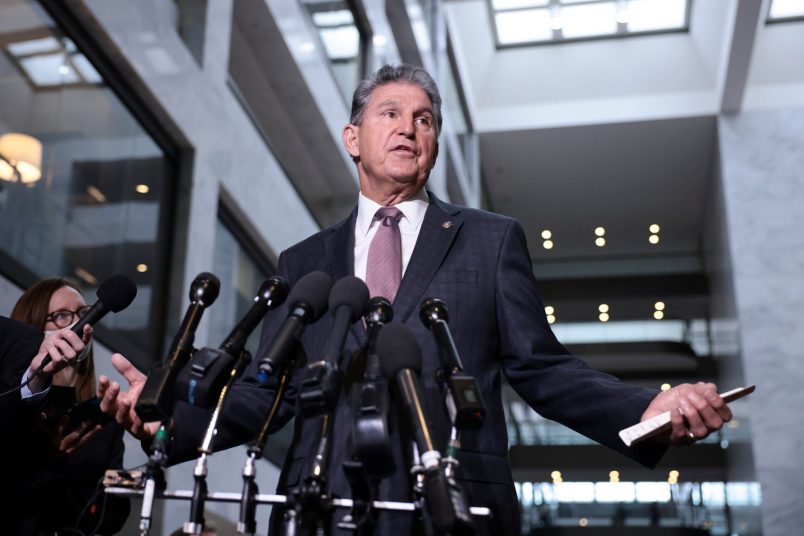Congress is back in session, but we’re continuing what began as a recess-time series of evening briefings on the reconciliation negotiations. Check in here to find out how the sausage-making is going.
The Clean Electricity Performance Program (CEPP), the beating heart of Democrats’ reconciliation package, appears to be dead thanks to Sen. Joe Manchin’s (D-WV) opposition. He then delivered a swift blow to a plan B policy that some of his Democratic colleagues had floated to fill the gaping hole in the plan — a carbon tax — Tuesday morning, telling reporters that it’s not on the table.
The new, grim reality is that Democrats will pass whatever patchwork of climate-friendly policies they can smuggle by Manchin, and depend on the Biden administration to do what it can unilaterally. That’s already coming out in statements from congressional Democrats and the White House.
“No one policy, in our view, makes or breaks our chances,” Press Secretary Jen Psaki said Tuesday, adding that there are “multiple pathways” to meet President Joe Biden’s goals on cutting emissions.
“I don’t think we should stop fighting for the Clean Electricity Payment Program or a carbon fee — but if you look at what countries have done around the world, and if you look at what states are doing around the country, some of them do a cap and trade, some of them do a renewable portfolio standard,” Sen. Brian Schatz (D-HI), a climate hawk, told reporters. “There are at least half a dozen ways to take big bold climate action.”
A Really Great Lunch, Apparently
- There was a palpable mood shift between when Democratic senators entered lunch and when they left. Sen. Tom Carper (D-DE) said it was one of the best conversations they’ve had all year, and nearly all of the senators who commented on the discussion said they felt much more confident about pulling together a deal as soon as this week.
- Sen. Joe Manchin (D-WV) addressed the group, hearing their concerns and leaving them with the impression that he was working with congressional leadership to come to an agreement on topline numbers and basic programmatic elements by, hopefully, the end of the week. Sen. Kyrsten Sinema (D-AZ) was reportedly not there.
- Schatz in particular on his way out of the lunch said that he was “more optimistic than he’s been in several months” that they’re going to enact a “big bold climate bill.” I asked him where that confidence came from considering all the bleak climate news today, and he said “lots of private conversations.”
Fights To Come
- Manchin reportedly wants to seriously pare back the child tax credit — a potentially revolutionary anti-poverty measure that lifted three million children out of poverty for the first month the credit was delivered via the American Rescue Plan. Many Democrats take it extremely seriously, and it’s one of the most prized provisions in the reconciliation package. He wants to scale back the family income cap to just $60,000 and add in work requirements for eligibility, per an Axios report. That’s going to be an extremely tough sell, and some involved are trying to talk him out of it.
- Based on my conversations with some of the bill’s key proponents, Manchin had not informed them of his desired changes.
- One representative quote: “It needs to stay at a high level,” Sen. Cory Booker (D-NJ) said of the family income cap. “Not as high as it is, but we need to keep it at a high level.” The current cap for getting the full credit, as established in the American Rescue Plan, is $150,000 per family.







Fuck Joe Manchin.
spits
So 330 million people have to care more about one rich man keeping a job he doesn’t need, and a preening trollop who doesn’t even plan on keeping hers, than the welfare of every person in the country. What a fucked up system.
One representative quote: “It needs to stay at a high level,” Sen. Cory Booker (D-NJ) said of the family income cap. “Not as high as it is, but we need to keep it at a high level.” The current cap for getting the full credit, as established in the American Rescue Plan, is $150,000 per family.
I agree: we need as much buy in as possible to prevent it from becoming another “welfare” plan, portrayed, first, as giving money to the “undeserving,” then as something badly in need of reform and, finally, as something we’d have been better off not trying in the first place. And, the money could be better spent somewhere else.
With friends like Manchin, who needs Rethuglicans?
Hope fades…